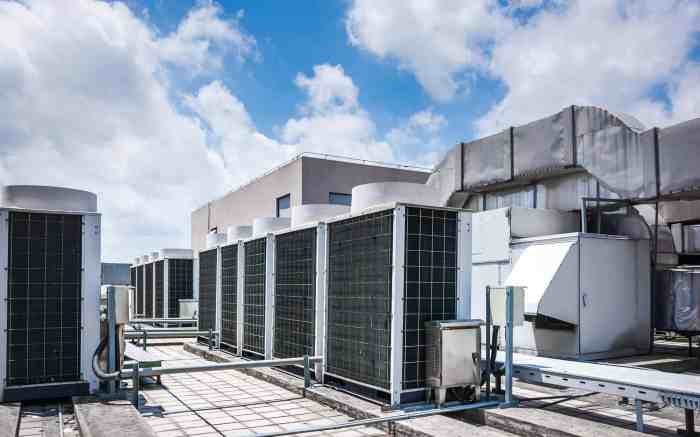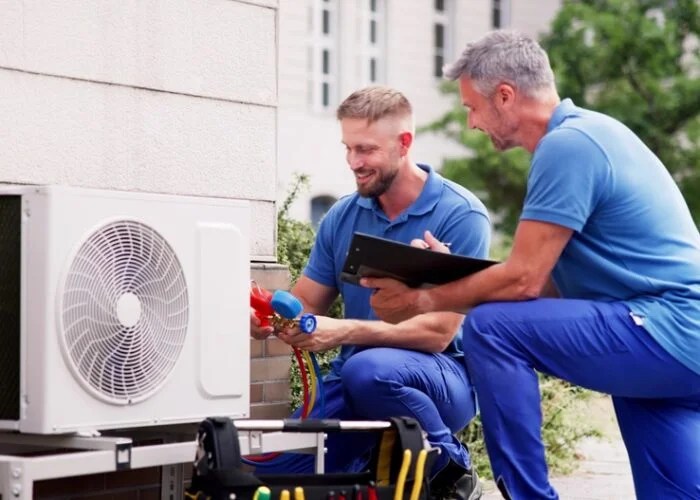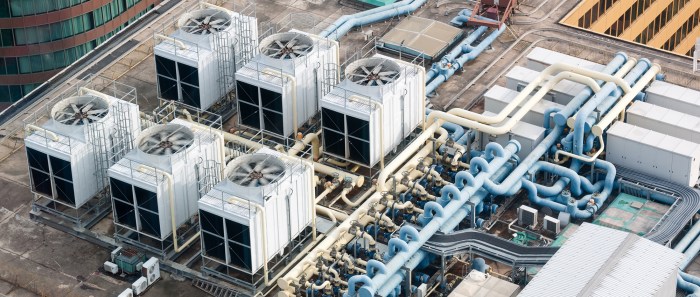Exploring HVAC Systems and Services
HVAC systems and services play a crucial role in ensuring comfort and efficiency in both residential and commercial spaces. From the components that make up these systems to the energy-efficient technologies shaping the industry, there is much to uncover and understand.
Let's delve into the world of HVAC systems and services, exploring the ins and outs of this essential aspect of modern living.
As we navigate through the different facets of HVAC systems and services, we will unravel the complexities and benefits that come with proper maintenance, installation, and energy efficiency.
HVAC Systems Overview

An HVAC (heating, ventilation, and air conditioning) system is a crucial component of any building, responsible for regulating indoor temperature, air quality, and humidity levels. It consists of several key components that work together to ensure a comfortable and healthy indoor environment.
Components of an HVAC System
- The Thermostat: This is the control center of the HVAC system, allowing users to set the desired temperature.
- The Furnace: Typically located in the basement or utility closet, the furnace heats air and distributes it throughout the building.
- The Air Conditioner: Found outside the building, the air conditioner cools and dehumidifies the air before circulating it indoors.
- The Air Ducts: These ducts transport heated or cooled air from the HVAC unit to different rooms in the building.
- The Air Filters: These filters remove dust, pollen, and other particles from the air, improving indoor air quality.
Function of Each Component
- The Thermostatregulates the temperature by signaling the HVAC system to heat or cool the air as needed.
- The Furnacegenerates heat by burning fuel or using electricity, which is then distributed throughout the building.
- The Air Conditionercools and dehumidifies the air, ensuring a comfortable indoor environment during hot weather.
- The Air Ductsdistribute the conditioned air to different rooms, maintaining consistent temperatures throughout the building.
- The Air Filterscapture dust, allergens, and other particles, preventing them from circulating in the air and improving indoor air quality.
Importance of Proper Maintenance
Regular maintenance of an HVAC system is essential to ensure optimal performance and longevity. Proper maintenance can help prevent costly repairs, improve energy efficiency, and extend the lifespan of the system. It also contributes to better indoor air quality, creating a healthier and more comfortable living or working environment.
HVAC Installation Process

When it comes to installing an HVAC system, there are several important steps that need to be followed to ensure everything runs smoothly and efficiently. HVAC professionals play a crucial role in this process, as they have the expertise and experience to handle the installation properly.
Steps Involved in Installing an HVAC System
Installing an HVAC system involves several key steps to ensure it functions properly and efficiently. Some of the main steps include:
- 1. Planning and designing the system layout to meet the specific needs of the space.
- 2. Properly sizing the HVAC equipment to ensure it can effectively heat or cool the space.
- 3. Installing the ductwork and ventilation system to distribute air throughout the building.
- 4. Connecting the HVAC unit to the electrical and fuel sources for operation.
- 5. Testing the system to ensure it is working correctly and efficiently.
Best Practices for Ensuring Efficiency During the Installation Process
Efficiency is key when it comes to HVAC installation, and following best practices can help ensure the system functions optimally. Some best practices include:
- 1. Properly insulating ductwork to prevent energy loss and improve efficiency.
- 2. Sealing ducts to prevent air leaks and maintain proper airflow.
- 3. Installing energy-efficient HVAC equipment to reduce energy consumption.
- 4. Following manufacturer guidelines for installation to ensure proper functioning.
- 5. Conducting regular maintenance to keep the system running efficiently over time.
Role of HVAC Professionals in Installing HVAC Systems
HVAC professionals play a crucial role in installing HVAC systems, as they have the knowledge and expertise to handle the installation process effectively. Their role includes:
- 1. Assessing the space to determine the best HVAC system for the specific needs.
- 2. Installing the system according to industry standards and regulations.
- 3. Testing the system to ensure it is working properly and efficiently.
- 4. Providing guidance on proper maintenance and care to ensure the longevity of the system.
HVAC Maintenance and Repair
Regular maintenance is crucial for keeping HVAC systems running efficiently and prolonging their lifespan. By performing routine maintenance tasks, homeowners can prevent costly repairs and ensure their HVAC system operates smoothly throughout the year. Additionally, proper maintenance can help improve indoor air quality and reduce energy consumption, leading to lower utility bills.
Importance of Regular Maintenance
- Change air filters regularly to ensure proper airflow and prevent dust and debris buildup.
- Clean the condenser and evaporator coils to improve energy efficiency and prevent system breakdowns.
- Inspect ductwork for leaks and seal any gaps to prevent air loss and maintain consistent indoor temperatures.
- Check refrigerant levels and ensure there are no leaks to prevent compressor damage and maintain cooling efficiency.
Tips for Troubleshooting Common HVAC Issues
- If your HVAC system is not cooling or heating properly, check the thermostat settings to ensure they are correct.
- Inspect air filters for dirt and debris and replace them if they are clogged to improve airflow and system performance.
- Check for any obstructions around the outdoor unit that may be blocking airflow and clean the area to improve system efficiency.
- If your HVAC system is making strange noises, it may indicate a mechanical issue that requires professional attention.
Significance of Hiring Professional Services for HVAC Repairs
- Professional HVAC technicians have the knowledge and experience to diagnose and repair complex HVAC issues accurately.
- Hiring professional services ensures that repairs are done correctly, preventing further damage to the system.
- Professional technicians have access to specialized tools and equipment needed to repair HVAC systems efficiently.
- Regular maintenance by professionals can help identify potential issues early on and prevent costly repairs in the future.
Energy Efficiency in HVAC Systems

Energy-efficient HVAC systems play a crucial role in reducing utility costs for homeowners and businesses alike. By optimizing energy consumption, these systems help lower electricity bills and decrease overall energy usage.
Latest Advancements in Energy-Efficient HVAC Technology
Advancements in energy-efficient HVAC technology have revolutionized the way we heat and cool our indoor spaces. From smart thermostats that learn your schedule to variable-speed compressors that adjust based on real-time demand, the latest HVAC systems are designed to maximize efficiency while providing optimal comfort.
Recommendations for Improving Energy Efficiency
- Regular Maintenance: Schedule annual maintenance checks to ensure your HVAC system is running at peak efficiency.
- Upgrade to Energy-Star Certified Equipment: Consider replacing old HVAC units with energy-efficient models that have the Energy Star label.
- Seal Leaks and Insulate: Properly seal ductwork and insulate your home to prevent air leaks and improve overall energy efficiency.
- Programmable Thermostats: Install a programmable thermostat to adjust temperature settings based on your schedule, reducing energy waste when you're not home.
- Zoning Systems: Implement zoning systems to control heating and cooling in different areas of your home independently, optimizing energy usage.
Indoor Air Quality and HVAC Systems
Indoor air quality is a crucial aspect of maintaining a healthy and comfortable environment within homes and buildings. HVAC systems play a significant role in regulating indoor air quality by controlling temperature, humidity, and ventilation.
Impact of HVAC Systems on Indoor Air Quality
Properly functioning HVAC systems can help remove contaminants such as dust, pollen, and mold from the air, improving overall air quality. On the other hand, poorly maintained HVAC systems can contribute to indoor air pollution, leading to health issues like allergies and respiratory problems.
Importance of Proper Ventilation in HVAC Systems
Ensuring adequate ventilation in HVAC systems is essential for maintaining good indoor air quality. Proper ventilation helps to remove stale air, control humidity levels, and prevent the buildup of harmful pollutants. Regularly changing air filters and scheduling professional HVAC inspections can help ensure proper ventilation.
Tips for Enhancing Indoor Air Quality through HVAC System Maintenance
- Regularly change air filters: Clean or replace air filters every 1-3 months to prevent the buildup of dust and debris.
- Schedule professional HVAC inspections: Regular maintenance by HVAC professionals can help identify and address any issues that may impact indoor air quality.
- Control humidity levels: Use a dehumidifier or humidifier to maintain optimal humidity levels in your home, typically between 30-50%.
- Use air purifiers: Consider using air purifiers with HEPA filters to remove airborne particles and improve air quality.
Epilogue
In conclusion, HVAC systems and services are not just about heating, ventilation, and air conditioning; they are about creating environments that are conducive to productivity, health, and well-being. By understanding the nuances of HVAC systems and services, we can make informed decisions that enhance our quality of life.
Clarifying Questions
What are the key components of an HVAC system?
An HVAC system typically consists of a furnace or heat pump, an air conditioner, ductwork, vents, and a thermostat. Each component plays a vital role in regulating temperature and airflow.
How often should HVAC systems be maintained?
It is recommended to have HVAC systems serviced at least once a year to ensure optimal performance and efficiency. Regular maintenance can prevent costly repairs and prolong the lifespan of the system.
What are the benefits of centralized HVAC systems?
Centralized HVAC systems offer uniform heating and cooling throughout a building, are easier to maintain, and can be more energy-efficient compared to decentralized systems.
How can homeowners troubleshoot common HVAC issues?
Homeowners can check air filters, thermostat settings, and circuit breakers, as well as ensure that vents are not blocked to troubleshoot common HVAC issues. If problems persist, it is best to contact a professional.
What role do HVAC professionals play in system installation?
HVAC professionals have the expertise to properly install HVAC systems, ensuring they are correctly sized, configured, and connected. Their knowledge helps optimize system performance and efficiency.